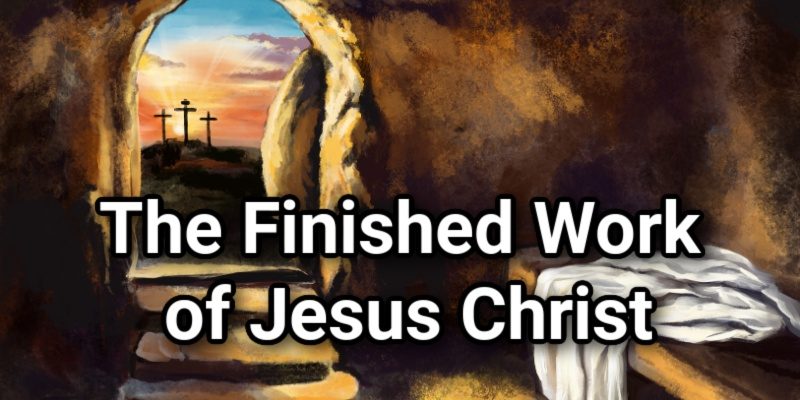Lord’s Library editors compiled this introductory guide to the Finished Work of Jesus Christ for your edification.
The meaning of the finished work of Jesus Christ is His Gospel. This blood atonement is the key piece of the core of the Christian faith, telling us that salvation is by grace through faith. On the flip side, this means salvation cannot come by religious work or deed. This Gospel truth is revealed throughout the New Testament Scriptures, highlighting the sufficiency of Christ’s sacrifice and God’s unmerited favor towards humanity.
The foundation of this doctrine is rooted in Ephesians 2:8-9. See: “For by grace are ye saved through faith; and that not of yourselves: it is the gift of God: Not of works, lest any man should boast.” These verses clearly outline that salvation is a gift from God, not something that can be earned through lawful adherence. It is purely the result of God’s grace, bestowed upon those who place their faith in Jesus Christ.
The Finished Work of Jesus Christ
Christ’s work on the Cross is the pinnacle of God’s redemptive plan for mankind. In His final moments, captured in John 19:30, Jesus says: “It is finished.” This shows the completion of the finished work of Jesus Christ required for salvation. His death on the cross paid the penalty for sin in full. This concept is further explained in 1 Peter 3:18: “For Christ also hath once suffered for sins, the just for the unjust, that he might bring us to God, being put to death in the flesh, but quickened by the Spirit.” Jesus, being sinless, bore the sins of humanity to reconcile us to God. And this sacrifice was once and for all, never needing repetition.
Romans 3:23-24 teaches the universality of sin but also the universal offer of grace: “For all have sinned, and come short of the glory of God; Being justified freely by his grace through the redemption that is in Christ Jesus.” The law exposed humanity’s inability to live righteously, but Christ’s finished work made a way for redemption through faith, not through adherence to that law. Romans 6:23 echoes this: “For the wages of sin is death; but the gift of God is eternal life through Jesus Christ our Lord.”
In his letter to the Galatians, the Apostle Paul combats the idea that the law can add to what Christ accomplished. See Galatians 2:21: “I do not frustrate the grace of God: for if righteousness come by the law, then Christ is dead in vain.” The finished work of Jesus Christ ensures that no human effort can be added to the salvation equation. Attempting to earn righteousness through the law or good works nullifies the very purpose of Christ’s sacrifice.
This grace is accessible to all who believe in the finished work of Jesus Christ. See Romans 10:9: “That if thou shalt confess with thy mouth the Lord Jesus, and shalt believe in thine heart that God hath raised him from the dead, thou shalt be saved.” Titus 3:5 reaffirms: “Not by works of righteousness which we have done, but according to his mercy he saved us, by the washing of regeneration, and renewing of the Holy Ghost.”
Hebrews 10:10 assures believers that Christ’s single offering was sufficient for all time: “By the which will we are sanctified through the offering of the body of Jesus Christ once for all.” There is no need for continual “sacrifice” because Christ’s work was complete and perfect.
The doctrine of salvation by grace through faith in the finished work of Jesus Christ leaves no room for self-reliance, as we can see. Romans 5:1-2 explains the peace and standing believers have through Christ: “Therefore being justified by faith, we have peace with God through our Lord Jesus Christ: By whom also we have access by faith into this grace wherein we stand, and rejoice in hope of the glory of God.”
As it is written in John 3:16: “For God so loved the world, that he gave his only begotten Son, that whosoever believeth in him should not perish, but have everlasting life.” This is the good news of the Gospel: salvation is freely available to all who trust in the finished work of Jesus Christ.
Lord's Library is a Christian resource hub. Our editors use a variety of internet research methods like search engines, audio and video, AI, consultations with ministry leaders in the field, and more. Lord's Library should never be a substitute for reading your Bible daily as the Scriptures are to be our final authority on all matters. Lord's Library participates in affiliate programs. We may make a small commission from products purchased through this resource.
- What Does the Bible Say About Achievements? With Key Scriptures - April 11, 2025
- What does the Bible Say About Abortion? With Key Scriptures - April 11, 2025
- Prosperity Gospel Meaning in the Scriptures: Is it Biblical? - April 7, 2025












